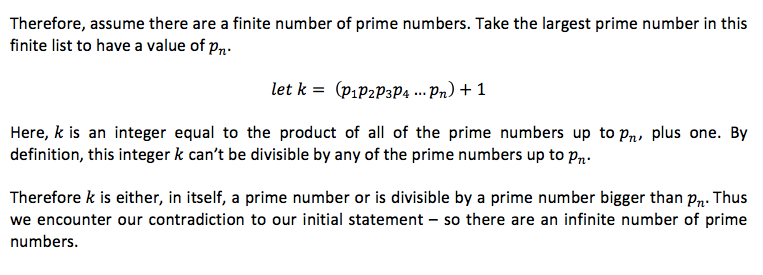Euclid's Proofs for Prime Numbers
- Stem To Go

- Aug 11, 2021
- 3 min read
The prevalence of prime numbers:
Mathematics is the pursuit of studying the intangible landscape of numbers. Often left to their imaginations, mathematicians endeavor to find formulas and explanations for even the most trivial of areas because the act of understanding is arguably the most important aspect of living.
Unlike the other sciences, mathematics is a subject of absolute certainty – whilst physics accepts theories that show evidence beyond reasonable doubt, the mathematical community accepts nothing less than a watertight proof that gives us irrefutable evidence.
So it is unnerving that this subject of logic, order, and reason stands on the foundations of one of the most chaotic and unpredictable patterns of all time. The core of this fluent and articulate language is an irrational enigma. Prime numbers.
By definition, a prime number is a positive integer that is divisible only by one and itself. Note that one is not a prime number.
Though prime numbers have had an evasive presence for thousands of years, we draw no closer to understanding the distribution of these fundamental beasts. Over the years, even mathematical giants such as Euler, Gauss, and Riemann attempted and failed to prove there’s an exact order in this irregular heartbeat of numbers (though they all contributed significant advancements to the potential understanding of this unknown problem).
Who was Euclid?
Euclid was a Greek mathematician (based in Alexandria, Egypt) who was alive circa 300 B.C. (during the Hellenistic Empire) – he is often referred to as the “father of geometry” due to his most famous text on the “Elements” (texts that are still referenced today some 2000 years later).
In general, not much is known about Euclid’s life. We can predict he was often based in Athens and later became a reputable teacher, having established his own school in Alexandria. However, it’s not his personal life that is worthy of note, but rather his written works that were left behind. His most famous of which is the “Elements” (a standard and popular textbook on geometry used for the next 2000 years). This 13-volume textbook was outnumbered only by editions of the bible.
Euclid - Prime numbers:
Euclid’s most notable achievements were undoubtedly in his work with prime numbers (although there is also major merit for his establishment of Euclidean geometry). In his lifetime, Euclid managed to prove two of the most fundamental facts in mathematics:
The list of prime numbers is infinite
That every number can be written as the product of prime numbers
Euclid’s breakthroughs in regards to prime numbers placed more focus on the study of prime numbers for future mathematicians (an interest that has remained ever since).
Proof: the list of prime numbers is infinite:
There are many different ways to prove a particular mathematical fact is true, however, the way that Euclid proved there is an infinite amount of prime numbers is through proof by contradiction. This involves making an initial statement about your mathematical fact (i.e. it is true). Whilst carrying out your proof, you’ll reach a contradiction that will disapprove your initial statement thus proving your statement true or false (depending on the nature of your initial statement).

Proof: every number can be written as the product of prime numbers:

References:
Waerden, Bartel Leendert. “Euclid | Biography, Contributions, & Facts.” Encyclopedia Britannica, www.britannica.com/biography/Euclid-Greek-mathematician. Accessed 17 Dec. 2020. Strong Induction | Brilliant Math & Science Wiki. (n.d.). Brilliant. Retrieved 24 July 2021, from https://brilliant.org/wiki/strong-induction/



Comments